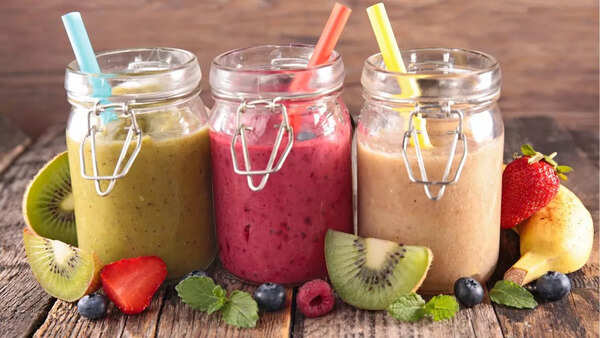Smoothies have become a popular breakfast choice, lauded for their nutrient density and convenience. Ideal for those rushed mornings, they offer a swift and invigorating start to the day. Packed with fruits, vegetables, and other wholesome components, smoothies can be personalized to suit individual tastes and nutritional needs. With a vast array of ingredient combinations, crafting a delicious and nutritious smoothie is easily achievable. Whether the goal is to enhance energy levels, aid in weight management, or simply enjoy a healthful breakfast, smoothies present a compelling option. However, it's important to consider potential drawbacks of incorporating smoothies into your daily breakfast routine.
A smoothie is essentially a chilled, blended beverage comprising a mix of ingredients, typically fruits, vegetables, and a liquid base such as milk or water. These components are pureed in a blender, resulting in a smooth and creamy consistency.
Popular Smoothie Ingredients:

Being attentive to ingredients and portion management can help mitigate these risks.

1. Green Smoothies - These incorporate greens like spinach, kale, or arugula, blended with fruits and vegetables to mask any bitter flavors.
2. Fruit Smoothies - These are crafted with a medley of fresh, canned, or frozen fruits, such as bananas, berries, or other preferred fruits.
3. Protein Smoothies - Designed to augment protein intake, these smoothies may contain animal or plant-based protein sources such as milk, yogurt, or protein powder. They are especially favored by fitness enthusiasts for muscle building and repair.
Newer articles
Older articles
 Esha Gupta Sets Record Straight: Actress Addresses Hardik Pandya Dating Rumors
Esha Gupta Sets Record Straight: Actress Addresses Hardik Pandya Dating Rumors
 Google Maps to Boost Navigation Accuracy with Fused Orientation Provider API
Google Maps to Boost Navigation Accuracy with Fused Orientation Provider API
 Global Vaccination Rates Plunge: Millions of Children Now Vulnerable to Preventable Diseases
Global Vaccination Rates Plunge: Millions of Children Now Vulnerable to Preventable Diseases
 Rishabh Pant: Greg Chappell Hails India Star as Cricket Revolutionary
Rishabh Pant: Greg Chappell Hails India Star as Cricket Revolutionary
 Skin Cancer Alert: How to Identify Suspicious Moles and Early Warning Signs
Skin Cancer Alert: How to Identify Suspicious Moles and Early Warning Signs
 Gavaskar Calls for Kuldeep Yadav's Inclusion in Second Test Amid Bumrah Fitness Concerns
Gavaskar Calls for Kuldeep Yadav's Inclusion in Second Test Amid Bumrah Fitness Concerns
 Is Daily Pooping a Must? Understanding Bowel Regularity and When to Worry
Is Daily Pooping a Must? Understanding Bowel Regularity and When to Worry
 Suryakumar Yadav's Sports Hernia: Understanding the Injury, Recovery, and Risk Factors for Athletes
Suryakumar Yadav's Sports Hernia: Understanding the Injury, Recovery, and Risk Factors for Athletes
 Vijay Sethupathi Apologizes Amid Controversy Over Son Surya's Debut Film 'Phoenix' and Alleged Video Removal Pressure
Vijay Sethupathi Apologizes Amid Controversy Over Son Surya's Debut Film 'Phoenix' and Alleged Video Removal Pressure
 Install Baccarat Hack Tool: The Secret to Winning
Install Baccarat Hack Tool: The Secret to Winning